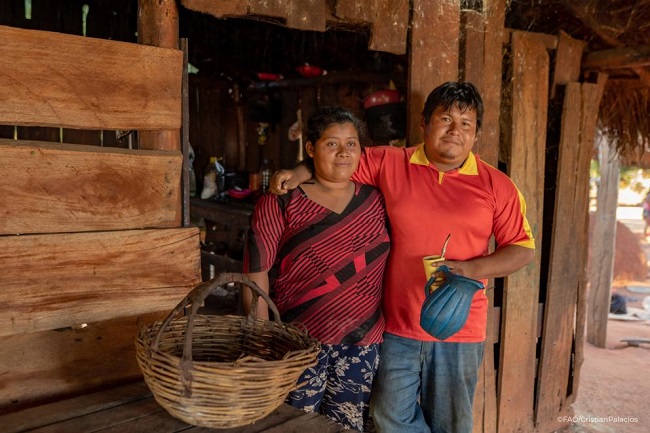For generations, the Ava Guaraní, one of the Indigenous Peoples living in eastern Paraguay, have been harvesting the green leaves of the yerba mate tree to make the bitter, caffeinated brew beloved in South America and beyond. However, the leaves they traditionally harvested in the wild have become increasingly scarce, partly due to climate change.

Ariel Benitez, a descendant of the Ava Guarani, is working to change that. He and his fellow community members in Ka’atymiri San Francisco, about 230 kilometres from the capital, Asuncion, cultivate seedlings to grow the crop. They’ve planted more than 1,500 in combination with several other species of native trees, which are important for both the local ecosystem and as traditional sources of food and medicines.
“They (the trees) are adapting and growing very well. You can tell that they are in a land that is familiar to them,” says Ariel.
It’s part of the $90.3 million “Poverty, Reforestation, Energy and Climate Change” (PROEZA) project, financed by the Green Climate Fund (GCF) and implemented by the Government of Paraguay with the support of the Food and Agriculture Organisation of the United Nations (FAO).
This cross-cutting project promotes forest planting and reforestation, carbon sequestration, and climate resilience in local communities by encouraging sustainable agroforestry. Families are given supplies, machinery, and external technical assistance to help plant trees and care for the crops.
The community leader, Ariel, had just been born when his family settled in the middle of 600 hectares of forest and yerbales (an area where mate is plentiful) in the Capiibary district of the department of San Pedro.
For Ariel and his community of about 25 families, “Yerba mate is a sacred plant used for our consumption and as a natural remedy,” he explains. “When there are religious ceremonies, it is always present.”
PROEZA taps into community knowledge and ancestral wisdom. The community has long been replicating the techniques practised by the Ava Guaraní Indigenous Peoples since before the arrival of the Spanish in the country. These techniques, involving knowledge of the lunar cycles for pruning and harvesting, natural control of pests and diseases and soil conservation are reliable and environmentally friendly.
The yerba mate seedlings planted in May 2022 will be ready for harvesting from the fourth year onwards. Once they reach that stage, they can look forward to over 60 years of productivity, judging from experience elsewhere in the country. Paraguay’s average yield per hectare is 5,000 kilogrammes per hectare, generating an average gross income of $1,100 per hectare annually, a significant amount for the average family in this community.
Rebecca Gauto Alegre has reforested her farm with native trees, innovating her subsistence farming practices with the agroforestry techniques implemented in the PROEZA project. “Most of us who are participating in PROEZA in the community are women. I believe women are taking good ownership of the project. The forest is almost all gone; it’s all disappeared. There is very little left. This work means our children may once again have trees.” she says.
Nature’s supermarket
In many countries, drinking yerba mate infusions with hot or cold water is a part of daily life. The plant, whose scientific name is Ilex paraguariensis, is increasingly being exported to countries worldwide, where it is sold mainly as an energy-boosting tea.
But it’s far from the only resource in Ariel’s community. “The forest is our supermarket. It has everything we need: remedies, food, wild animals, fruit…,” says Treli Gabriela Fernández, Ariel’s partner. She adds that they feel strongly about protecting and strengthening the remaining forest with the help of traditional practices that have been passed down the generations and will be shared with the couple’s four children, now aged between three and 12.
The most challenging times for the community are those when not enough food is produced in certain cycles of the year or because of the impact of the weather. Responding to this need, the PROEZA project also promotes the production of beans, maize, watermelons, melons and cassava for families’ own consumption and income generation.
Conserving nature
When grown together with other trees and under their shade, yerba mate is an asset for conserving the native forest. Much remains to be done to increase the forest cover, including strengthening the enforcement of environmental legislation, but communities are starting to feel a positive impact from the project.
“Now, the heat and wind can be extreme, but we don’t feel it so much because there is still a little bit of forest left,” says Treli. “We regret climate change because the trees are disappearing.”
From generating income opportunities and reducing greenhouse gas emissions to reviving forests and reinforcing spiritual practices, the PROEZA project delivers multiple environmental, economic and cultural benefits to the Indigenous Peoples and to nature. The Ka’atymiri San Francisco Indigenous community’s success and ongoing efforts with yerba mate show how agriculture, combined with ancestral knowledge, can go hand in hand with nature to forge a path towards a more sustainable and climate-friendly future.
Story originally published by FAO in 2024. Edited by Zeenia Dastur and Deborah Hong in 2025
